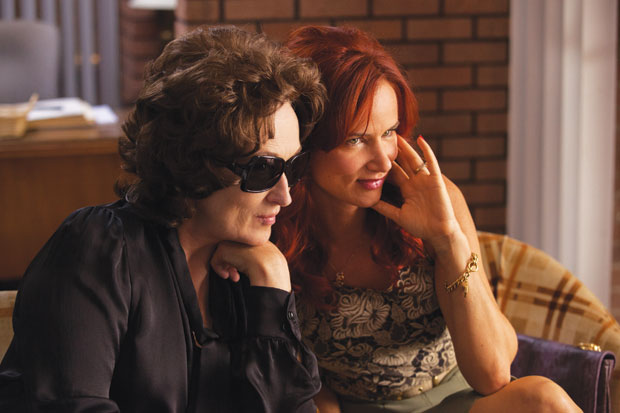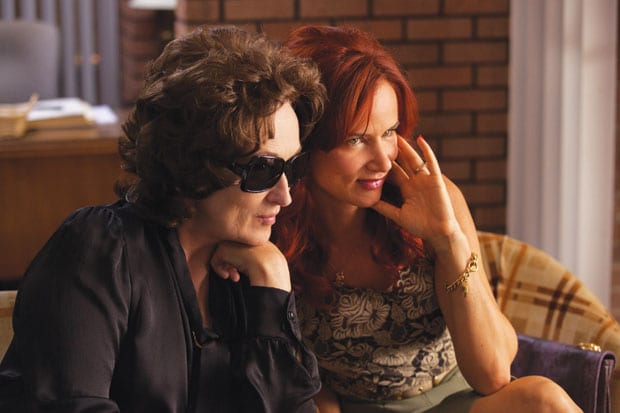Rolling Meryl-y along in ‘Osage;’ plus geek love in ‘Her’ and a brutal ‘Survivor’

OSCAR CONTENDERS | Meryl Streep (above with Juliette Lewis) in ‘August: Osage County,’ Joaquin Phoenix (below) in ‘Her’ both have shots at Oscar nominations next week; Peter Berg’s ‘Lone Survivor (bottom) is a long-shot. All are now playing in wide release.
ARNOLD WAYNE JONES | Life+Style Editor
As if you need more proof that Meryl Streep is our greatest film actress, all you have to do is poke your head into the first five minutes of August: Osage County. The first time we see the three-time Oscar winner as Violet Weston, the matriarch of an Oklahoma clan of tortured intellectuals, she’s stoned on pills and maybe a little drunk, mean as a Republican at union hall and looks like a mangy cat, her hair falling out in tufts from chemo. She hisses her venom at her husband (who’s used to it) and a stranger (who’s not). She’s despicable. And you can’t take your eyes off her.
That’s what Meryl does: She delivers, time and again, unnerving, raw stage-actress performances on film: Toned down, perhaps, for the camera, but not compromised. She’s not afraid to be ugly and unlikable, and she’s never looking for her key light. She’s a character actress with star billing.
That said, even La Streep’s performance in the film adaptation of Tracy Letts’ Tony- and Pulitzer-winning play isn’t as compelling as Deanna Dunagan’s interpretation on Broadway (one of the greatest bits of stage acting I’ve ever seen). She makes different (not worse) choices and the film, directed by TV vet John Wells (ER, The West Wing), necessarily alters the emotional journey of the Weston family, populated with addicts, idiots, incestuousness and anger, doled out in bitter little bits. Those choices — Streep’s, Wells’, Letts’ (he wrote the screenplay, too) — are necessary to “open up” a one-set play and turn it into a film. Get over that, though, and wallow in one of the best-acted films of the season.
It’s not just Streep, towering a presence as she is, who scores in the flashy role of Violet, a junkie with a bitter streak who can ruin a family dinner with a well-placed invective. Chris Cooper (who won his Oscar opposite Streep, in Adaptation) turns his lay-about husband role into a proud and fragile giant, with Margo Martindale clucking her way expertly as his dismissive wife.
Even Julia Roberts, who hasn’t turned in a decent performance in a decent movie for a decade (aside from a serviceable supporting role in Charlie Wilson’s War) has matured into her version of a character actress, though her final scene (a tack-on not in the play) undercuts her character’s arc.
August: Osage County onstage paid great homage to the electric family dynamics of Tennessee Williams, Eugene O’Neill and Arthur Miller, juiced by doses of humor. The film may not transition as well, but with acting like this, you can overlook it. It rolls Meryl-y along.
 For a film that basically requires you to watch Joaquin Phoenix talk to himself for two hours, Her may be the most romantic reverie since the French New Wave. And like the auteurs of that era, filmdom’s standard-bearer for hopeful geeks, Spike Jonze, is responsible.
For a film that basically requires you to watch Joaquin Phoenix talk to himself for two hours, Her may be the most romantic reverie since the French New Wave. And like the auteurs of that era, filmdom’s standard-bearer for hopeful geeks, Spike Jonze, is responsible.
Set in the near but nondescript future — a future where technology has become so seamlessly integrated into our lives that Internet companies do everything for you, including composing hand-written thank-you notes — it focuses on Theodore (Phoenix), a cubicle drone who’s been walking around in a fugue state since divorcing his wife Catherine (Rooney Mara). His neighbor Amy (Amy Adams) tries setting him up on dates, and may even burn a candle for him, but Theodore is as unreachable as a kid with autism: High-functioning, but isolated.
When Theodore downloads the hot new operating system, one with artificial intelligence (she even has a name, Samantha, and is voiced by Scarlett Johannson), he finds a soulmate without a soul: A program literally designed to give his ego a boost. And he falls in love.
What makes this a Spike Jonze film, and not some tongue-wagging bit of run-of-the-mill sci-fi, is how inevitable and normal Theodore’s relationship seems — not just to him and his friends, but to the audience. Why not connect with a disembodied intelligence? Isn’t that the appeal of chatroom? Or even Grindr? If people have can have virtual sex, why not virtual love?
Phoenix, an inherently remote actor, has found his perfect fit of character and role here. His vulnerable otherworldliness has never served him better, and it’s almost arresting to see him laugh. Although she never appears physically onscreen, Johansson is nevertheless an integral element of the film. Her voice is warm and seductive, and she flirts with our ears as much as anything.
Rather than being a cautionary tale, a warning of the dangers of technology and its ability to dehumanize us, in Her Jonze is saying something more hopeful: He is suggesting that our emotions are real, no matter how (or on what) we focus them. Love, heartbreak, disappointment, loss, loneliness, giddiness, infidelity: These exist in our minds, no matter who we are attracted to. It’s a metaphor for the beauty of love in all forms. Ultimately, Samantha engulfs Theodore in the warmth of a loving embrace, even if she’s without arms to hold him. Don’t the best movies do that to us, too?
Peter Berg is probably best known to Texans as the creative force behind the TV series Friday Night Lights, the somber, hand-held drama about small-town high school football. Berg developed a style with that show, which he’s tried to transfer over into films … unsuccessfully. The special effects-heavy Hancock and Battleship were temperamentally ill-suited for the gritty look Berg cultivates.
 But he’s finally hit the big-screen sweet spot with Lone Survivor, a boots-on-the-ground war picture about a squadron of SEALs in Afghanistan whose mission to take out a Taliban leader went horribly wrong — you can tell by the title that’s how costly it turned out.
But he’s finally hit the big-screen sweet spot with Lone Survivor, a boots-on-the-ground war picture about a squadron of SEALs in Afghanistan whose mission to take out a Taliban leader went horribly wrong — you can tell by the title that’s how costly it turned out.
But it takes a while to get that far, and what precedes it — the camaraderie between the toughened soldiers (Mark Wahlberg, Taylor Kitsch, Emile Hirsch, Ben Foster), the hazing of newbies (including a fairly gay solo dance in front of hooting enlistees), the macho posturing (there’s a lot of shirtless hunks early on) — set a tone of authenticity and sacrifice. It’s partly because the film isn’t solely about the mission that it works as something more than a war film. It’s a human tale that recalls the mantra of the coach on FNL: “Clear eyes, full hearts, can’t lose.”
This article appeared in the Dallas Voice print edition January 10, 2014.

